Troubled Carpetright has today put forward a proposal to close nearly a quarter of its stores and renegotiate rents on a chunk of others through a CVA – a controversial restructuring tool.
Although CVAs are seemingly in vogue, having been launched by New Look and Toys R Us in recent months, it’s a strategy no retailer would take lightly.
In the case of Carpetright, the move to shut 81 of its shops – along with 11 other sites that are no longer trading – involves axing as many as 300 jobs.
“We’ve carefully planned this with Deloitte, so we’re confident landlords and shareholders will go for it”
Wilf Walsh
Wilf Walsh, chief executive of Carpetright, said the CVA was “tough but necessary” as it would enable the business to address its “burden” of ”too many poorly located stores on unsustainable rents”. He added that the action was “essential” to restore the firm’s fortunes and profitability.
Carpetright’s plan needs to be approved by 75% of its landlords and the majority of its shareholders by value in votes scheduled later this month.
But speaking to Retail Week shortly after unveiling the plans, Walsh appeared confident that the CVA will be given the green light.
“We’ve carefully planned this with Deloitte, so we’re confident landlords and shareholders will go for it,” he said.
It is promising that trade body the British Property Federation (BPF) has applauded Carpetright’s approach to the CVA.
BPF assistant director of real estate policy Stephanie Pollitt said: “Carpetright and Deloitte have demonstrated best practice, constructively engaging with the BPF early in the process and ensuring landlords’ interests have been properly taken into account.”
But, if the strategy is cleared, will the closures and cost savings be enough to heal the injured floorings firm, or will the CVA act as a temporary bandage on a permanent wound?
A panacea to Carpetright’s woes?
Carpetright told Retail Week that its burdensome and expensive portfolio of 415 stores is preventing it from keeping up with the pace of change.
“We cannot keep kicking this can down the road. With the stores we have, we cannot move fast enough,” Walsh said.
He seemed sure that a liberated and lighter Carpetright would stand a better chance of beating off the threat of the competition, and was calm about the scale of the task ahead.
“We’ve closed 80 odd stores so we’re used to this process,” he said.
However, one industry insider was more cynical about the potency of Carpetright’s CVA, claiming that the move will be “helpful, but not the answer”.
“We want to invest more in the online proposition so we can cater for millennials”
Wilf Walsh
The source told Retail Week that 332 stores was still too many for the floorings retailer, and pointed to a need to improve the product offer, across both its bed and floorings ranges.
Another source said company culture would need addressing after recent events, including three profit warnings in three months, had put team morale under strain.
Walsh acknowledged himself that, even after the CVA, there would still be more work to do, and said separate plans to raise £60m through an equity capital raising would allow it to invest further in the business.
For example, although the company has ploughed money into a recent store refurbishment programme, Walsh seems eager to take this further.

“We will continue investing in the store estate – where we do, we are seeing a better performance, which is not a surprise.”
He also wants to ramp up the retailer’s digital proposition.
“We are already transactional but we want to invest more in the online proposition so we can cater for millennials who don’t want to go to retail parks,” he says.
Other battles to be won
While there’s no doubt that the CVA will give Carpetright some much-needed breathing space in terms of reduced costs, it – like all retailers in the sector – will still have the issue of consumer uncertainty to tackle.
Earlier this year, Carpetright said there was a sharp drop in shopper numbers in January and put this down to “reduced consumer confidence”. Today it said that trading conditions remained “difficult”.
When shopper sentiment is volatile, big-ticket retailers need to work harder to get consumers to part with their hard-earned cash.
With Brexit negotiations ongoing, the uncertainty shows little sign of abating.
What’s more, Carpetright has an aggressive competitor to fend off.
“I’m not going to listen to any more mischief making. We’ve got a plan, and we’re away”
Wilf Walsh
Tapi Carpets, launched in 2014 by Carpetright’s founder Lord Harris and his son Martin Harris, has opened 94 shops – many of which are near Carpetright stores – and has poached many of its employees.
The fledgling firm makes no secret of its ambitions and recently told Retail Week that it plans to ramp up its marketing activity, with its first TV adverts on the horizon for later this year.
“Now, we’re going to go for it,” said Lord Harris, divulging ambitions to grow Tapi’s footprint to as many as 250 stores.
Harris also offered to buy 97 Carpetright stores – an offer Walsh rebuffed.
“I’m not going to listen to offers from a competitor, especially not one that is making a sizeable loss,” Walsh told Retail Week.
“I’m not going to listen to any more mischief making. We’ve got a plan, and we’re away.”
If Carpetright achieves creditor and shareholder support for its CVA, its position will indeed be strengthened. However, it will still have a long road ahead of it to remain relevant in the cutthroat world of big-ticket retail.


















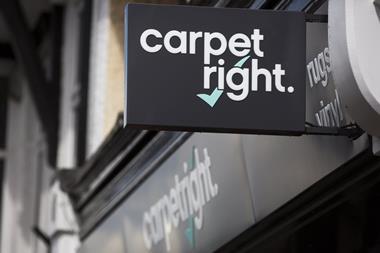
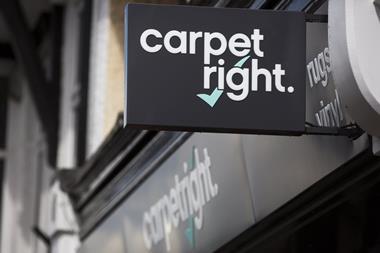
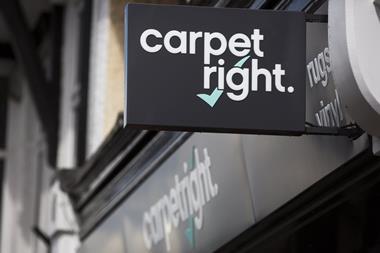

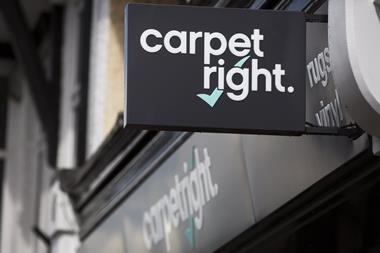
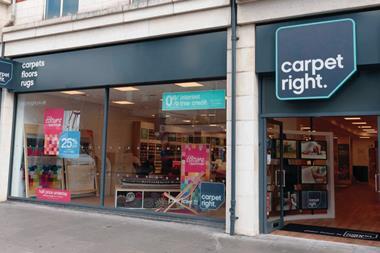
No comments yet